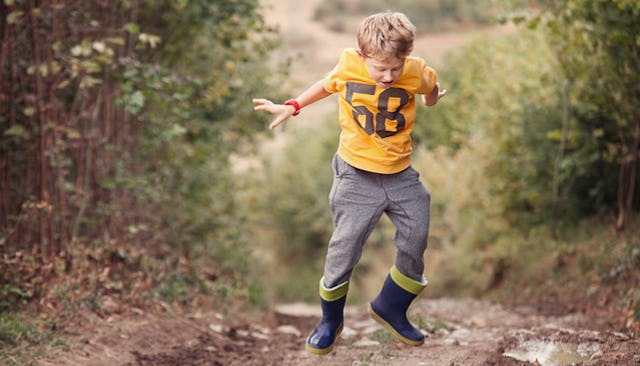I'm Not Going To Argue With My Kid About Him Wearing A Coat

I have a hot-blooded son. This fall, as our temperatures here in the Pacific Northwest have dipped from the 60s to the 50s and into the 40s, my 7-year-old insists on wearing shorts and T-shirts every day, indoors or out.
“It’s cold outside. Don’t you want to put on some pants?”
“No thanks, Mom.”
“Long-sleeved shirt at least?”
Nope, he’s fine. I don’t even bother asking him if he wants a jacket anymore, as there’s no chance he’ll say yes.
Perhaps it’s because he’s my youngest and I’ve been around this block before, or maybe it’s my naturally easy-going personality, but I’m not bothered by my son’s choice of clothing. If it’s cold, I usually suggest that he wear something warmer. I have him bring a jacket if I know we are going to be outside for a while, but I don’t force him to wear it.
I’ve witnessed some parents take a hard stance on this topic. I don’t consider myself a particularly permissive mom in any way, but I do pick my battles. Getting into a power struggle over pants or a coat is simply not worth it to me. If he’s cold, he’ll put on something more. If he refuses and ends up getting chilly, he’ll learn to wear something warmer next time. As long as it’s not actually below freezing outside, he’s not going to catch his death from the cold.
In fact, according to experts, he’s not going to catch anything. I was curious about the wisdom of making sure kids bundle up, so I did some research. Aside from hypothermia due to extra prolonged exposure to cold (which isn’t going to happen under normal life circumstances), letting them go without a jacket will not make them more likely to get sick.
The idea that kids catch colds or pneumonia from being cold is mostly a deeply entrenched old wives’ tale. Kids get colds from viruses, not from the temperature of the air or their bodies. People do tend to get sick more frequently in the winter, but that has more to do with being stuck indoors in close proximity with people and germs than with the weather. It’s sharing the same air with sick people that makes the difference, not the temperature of the air itself.
I did find in my research that there is some evidence that if a child is already sick, then being out in the cold can make their symptoms worse. It’s not definitive, but I know that I don’t feel like being out in the cold if I’m sick. So if your kids have a cold or some other virus, by all means, bundle them up. But if they’re healthy? There’s no harm in short sleeves.
I actually like to use preparing for the weather as a lesson in natural consequences. Much like a kid will learn to eat their dinner if they go to bed hungry, they’ll learn to put on pants and a jacket if they find themselves uncomfortably cold enough times. In fact, I’ve noticed recently that when I tell my son that it’s cold out, he’ll say, “I’ll bring my jacket, just in case.” He’s experienced enough chilled arms and legs due to his own choices to have gained that wisdom, so I rarely have to insist he bring a jacket anymore. Some kids need to learn certain lessons firsthand. The jacket/no jacket scenario is a safe one for kids to exercise their autonomy and experience the consequences of their choices, assuming it’s not literally below freezing outside.
Just today, we were getting ready to go to the store. It was 45 degrees and raining out, and my son was dressed like we were in Waikiki — short-sleeved polo shirt, shorts, and flip-flops.
“Have you looked outside?” I asked. He looked out the window, went to the coat closet, and put on his winter coat. And that’s how he went to the store — down jacket, shorts, and flip-flops.
He was perfectly comfortable.
I didn’t say a word.
[free_ebook]